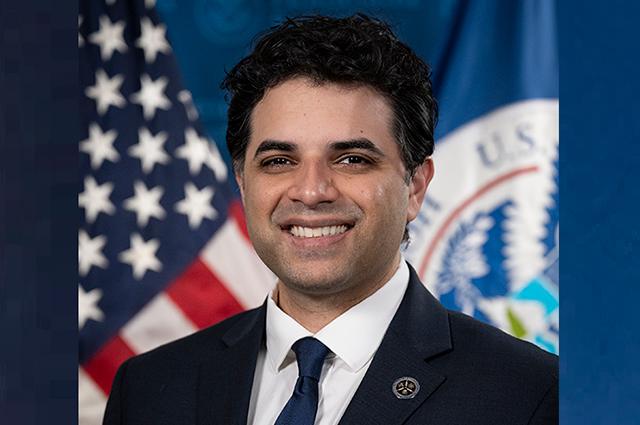-
About
- Departments & Offices
-
Academics
- Physician Assistant
- Special Master’s (MBS)
-
Admissions & Financial Aid
- Tuition & Fees
-
Student Life
-
Research
- Research Labs & Centers
-
Local & Global Engagement
- Global Health Programs
- Community Engagement
At the Critical Intersection of Public Health and Homeland Security
Promoting wellbeing of ‘communities and families’ makes the nation safer, says the triple Jumbo who is chief medical officer for DHS

Earlier this spring, physician Pritesh Gandhi, who studied international relations, economics, medicine, and public health at Tufts, was sitting across from his boss, Alejandro Mayorkas, the secretary of the Department of Homeland Security. As the chief medical officer for the department, Gandhi is the principal adviser to DHS leadership on health-related matters.
“Here we were, two children of immigrants, in a position to ensure that every single human being who is on American soil is treated with dignity and respect,” says Gandhi, A04, M11, MG11 (MPH). “And that moment underscored the responsibility we have in fulfilling the charge of our country, of our Constitution, of the expectations of the American people. That moment, and every day I’ve spent on the Southwest border over the last few months, seeing and hearing the stories of those in our care and custody and those who take care of them, have really moved me.”
Gandhi was appointed to the DHS spot by President Joe Biden in January, after serving as associate chief medical officer at People’s Community Clinic in Austin, a federally qualified health center, and as a clinical assistant professor at Dell Medical School at the University of Texas. In 2020, he made an unsuccessful bid in the Democratic primary in Texas’ 10th Congressional District, where he made health care a key part of his campaign.
At DHS, he sees a strong health care system as essential to every aspect of the department’s mission, and not only at moments of crisis.
“We have to allow ourselves to think critically about how we view threats to our community, whether those are internal or external threats,” he says. “When we think about homegrown threats to the United States, often these threats come from a position of a lifetime of being marginalized.
“How can we engage, from a public health and medical perspective, in marginalized communities to ensure that we are putting the wellbeing and health of families first? By doing so, we are not only promoting health security, we are fundamentally changing the role that public health has in people’s lives.”
COVID has inevitably altered the priorities and day-to-day operations of DHS, as it has for all aspects of the federal government, Gandhi says. It has also sent a strong message about the importance of public health.
“I think what this pandemic has shown us is that if we think about the need to build systems that promote the health and wellbeing of communities and families, we’re going to be better off as a nation,” he says. “We’re going to be safer. That’s the joy of being in this role.”
In advance of his address to the graduating classes of Tufts University School of Medicine and the Graduate School of Biomedical Sciences on May 23, Gandhi talked with Tufts Now about his new role in Washington.